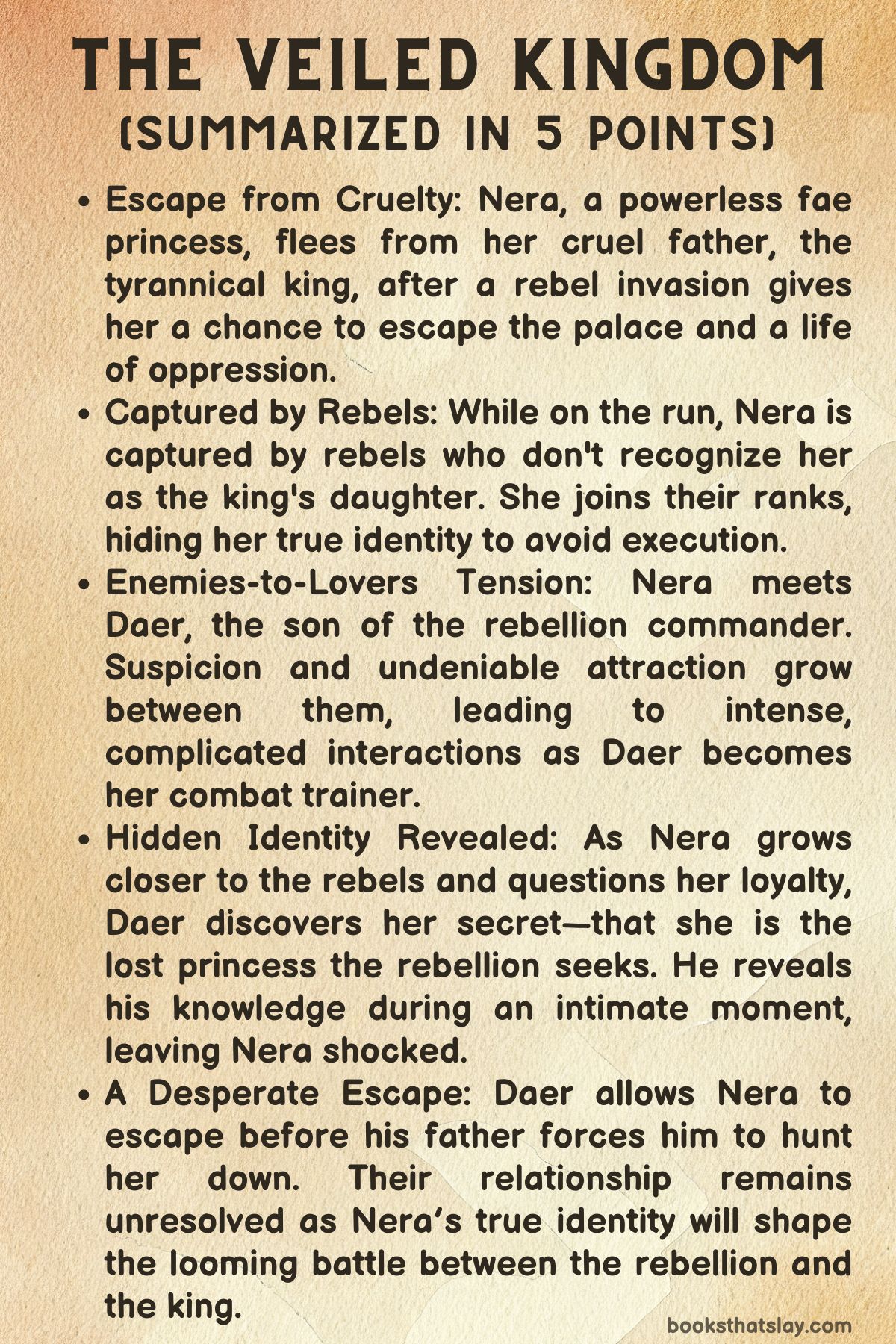The Veiled Kingdom Summary, Characters and Themes
The Veiled Kingdom by Holly Renee is a gripping fantasy romance set in a world of fae and rebellion. As the daughter of a tyrannical king, the female protagonist flees her cruel father, hiding her true identity as a powerless princess. Along the way, she gets caught up in a rebellion against the kingdom.
The novel weaves together themes of enemies-to-lovers, forbidden love, and political intrigue, following the heroine’s tumultuous journey through danger, deception, and an intense attraction to a rebellious warrior. With elements of slow-burn tension, magical secrets, and fierce loyalty, this story sets the stage for an epic romantic saga.
Summary
The story opens with Nera, the powerless princess of a fae kingdom ruled by her ruthless father, a king who greedily drains power from his subjects in a practice known as the “tithe.”
Nera has lived her life under her father’s cruelty, shamed for her lack of magical abilities, which is rare among the fae. Her mother died during childbirth, and after the king remarried, Nera was mistreated and kept hidden away.
When a rebellion against the king manages to invade the castle, Nera seizes her chance to escape the oppressive palace life, fleeing into the streets to avoid her father’s wrath.
Living as a fugitive, she meets a boy named Micah who helps her blend in with the rebels by giving her a fake rebel tattoo. However, her freedom is short-lived when she is captured by the king’s guards and thrown into a prison cell. There, she meets Ren, the daughter of the rebellion’s commander.
The two quickly form a bond, and Ren insists that Nera is one of the rebels to secure her release. Nera’s true identity as the lost princess remains hidden.
It is here that Nera meets Daer, Ren’s older brother, who is both suspicious of and drawn to her. Daer is the son of the rebellion’s ruthless commander, a man who is obsessed with finding the lost princess to overthrow the king.
Despite not trusting Nera, Daer takes her back to the hidden Veiled Kingdom, the rebel’s base, where she is forced to make a difficult decision—join the rebellion or face execution. Nera chooses to stay, hiding her identity while navigating her growing attraction to Daer.
Daer, responsible for training Nera in combat since she has no powers, is immediately suspicious of her but can’t deny their magnetic connection. As he teaches her to fight, the tension between them grows, leading to heated encounters. Their relationship is complicated by their mutual mistrust, but they cannot deny the chemistry between them.
Daer’s possessive nature becomes more evident as he protects her fiercely, even while grappling with his suspicion.
As Nera becomes closer to the rebels, she starts to question her loyalty to the kingdom and her father. However, just as her bond with Daer intensifies, Daer discovers the truth about her identity—that she is the missing princess the rebellion has been seeking all along.
In a dramatic and shocking climax, Daer reveals that he knows who she truly is while they are intimately involved. He allows her to escape, warning her to run before he is forced to hunt her down by his father’s command.
With a brewing war between the rebels and the king, Nera’s true identity will determine her fate, as well as Daer’s, in this enemies-to-lovers fantasy filled with passion, betrayal, and the tension of forbidden love.

Characters
Nera (Female Lead/Princess)
Nera is the hidden princess of the kingdom, and her journey is a central focus of the story. She was raised under the harsh cruelty of her father, the wicked king, who mistreated her due to her apparent lack of powers.
In their Fae world, having powers is essential, and Nera’s powerlessness makes her a disappointment in her father’s eyes, fueling his contempt for her. However, she isn’t merely passive.
Nera possesses a strong will to survive, as demonstrated by her escape during the rebellion’s raid on her father’s castle. She begins the story living on the streets, disguising her identity with a rebel tattoo, a symbol of defiance against the regime she comes from.
Her journey is filled with inner conflict—her loyalty to her kingdom is constantly clashing with her growing attachment to the rebels, particularly Daer. Nera’s character is intelligent and resourceful, managing to hide her identity from both her enemies and potential allies.
Her romance with Daer brings out her vulnerability, but she remains headstrong, never entirely submitting to him or his world. One of the most interesting aspects of Nera is her journey of self-discovery, particularly regarding her powers, which appear to awaken in the presence of Daer.
This arc teases a much larger destiny for her, as her power might be the key to resolving the conflict between the rebels and the tyrannical kingdom. Nera’s evolution from powerless princess to someone who can stand her ground both emotionally and physically is a compelling aspect of her character.
Daer (Male Lead/Warrior)
Daer is the son of the rebellion’s commander, making him one of the most influential characters in the rebel forces. From the moment he is introduced, his character is marked by a deep inner conflict.
He is immediately suspicious of Nera, sensing that she is hiding something. Despite this suspicion, he is drawn to her in a way that he cannot fully explain, which leads to a possessive, often contradictory relationship.
Daer’s character is defined by his protective yet controlling behavior—he tries to shield Nera from harm, but also keeps her under close surveillance, unable to fully trust her. This dynamic creates an ongoing tension between them.
Daer has a dark side, largely shaped by the trauma of losing his mother in the raid on the kingdom, which has fundamentally changed his father and, by extension, Daer himself. He exhibits a possessive nature, particularly in his physical interactions with Nera.
His attraction to her borders on dangerous, especially when mixed with the anger and frustration he harbors towards her for hiding her true identity. Daer’s character is one that grows on readers slowly, as his initially unlikable traits—such as his controlling behavior and harsh demeanor—seem to serve as a defense mechanism for a more complex emotional core.
His behavior at the end of the book, particularly when he reveals he knows Nera is the princess and then allows her to flee, suggests he is torn between duty and his desire to protect her. His arc promises significant growth, especially as his relationship with Nera deepens and he confronts his loyalty to the rebellion and his father.
King (Nera’s Father/Antagonist)
The king is a looming presence throughout the novel, even when he isn’t physically present in many scenes. He is depicted as a tyrant who wields his power over his subjects through the practice of the “tithe,” where he drains their magic to sustain his rule.
His cruelty towards Nera, driven by her supposed powerlessness, reveals a deep insecurity and greed. The king’s obsession with power and control sets the stage for the rebellion, as his rule pushes many to rise up against him.
His interest in finding his missing daughter suggests he sees her as either a potential threat or a tool to solidify his hold over the kingdom. The complexity of his character lies in his relationship with Nera—he’s not just a distant villain but someone whose personal cruelty directly impacts the protagonist.
Ren (Daer’s Sister)
Ren plays an essential role in shaping the early dynamics of the story. She is the one who insists on rescuing Nera when Daer comes to free her from the king’s dungeons, which sets the stage for Nera’s eventual involvement with the rebellion.
Ren’s character provides a contrast to the harsher personalities around her. She is more empathetic, developing a quick friendship with Nera.
However, she remains a relatively minor character in this first book, serving as a bridge between Nera and Daer. Her presence signals that there is room in the rebellion for compassion, offering hope that not all of the rebels are hardened by violence and anger.
Daer’s Father (Commander of the Rebels)
Daer’s father, the commander of the rebels, is another antagonist in the story, albeit in a more nuanced way than the king. Once a man of principles, his character has become consumed by vengeance following the death of Daer’s mother.
His obsession with overthrowing the king has pushed him into a dark place, and he is increasingly willing to resort to violence and cruelty to achieve his goals. His complex relationship with Daer is an interesting dynamic—while Daer respects his father’s leadership, he also recognizes that his father’s actions are growing more extreme.
The commander’s fixation on finding Nera, the missing princess, drives much of the plot, as it becomes clear that his motivations are not entirely noble. He is a character who has lost his moral compass, and his storyline hints at further conflict between him and Daer in future books, especially once the truth about Nera comes to light.
Micah (Nera’s Friend/Supporting Character)
Micah is a supporting character who plays a vital role in Nera’s survival after she escapes the palace. A street-dweller, Micah helps Nera blend in by giving her a fake rebel tattoo, symbolizing her break from the oppressive kingdom she hails from.
While Micah doesn’t have a large role in the plot, he represents the network of people who, like Nera, are caught between the rebellion and the king’s rule. His character embodies the resilience of the oppressed, offering a glimpse into the lives of ordinary people under the king’s tyranny.
Micah’s importance lies in how he helps Nera transition from the sheltered life of a princess to the harsh reality of life on the run.
The Grandmother
The grandmother appears briefly, but her role is filled with mystery. She seems to know far more than she lets on, especially when she advises Nera to stay close to her grandson, Daer.
There is a strong implication that she may know Nera’s true identity, or at least have an understanding of her significance. Her wisdom and cryptic advice add an element of intrigue to the story, and it’s possible that she will play a larger role in future books.
Her character also provides an emotional anchor for Daer, representing a sense of stability in his otherwise chaotic life.
Themes
The Multifaceted Nature of Power and Identity in an Enemies-to-Lovers Fantasy World
In The Veiled Kingdom, power is a driving force in both literal and metaphorical terms. It intricately weaves through character development, societal structures, and personal identity.
Power is not just physical or magical, but deeply political and psychological. The protagonist, Nera, faces the harsh reality of being perceived as powerless in a Fae society where power defines one’s worth and survival.
Her powerlessness in a magical sense mirrors her political powerlessness, as she is both the princess of a kingdom and a prisoner to her father’s cruel reign. Her identity becomes a source of shame, yet it also turns into a tool for rebellion when she hides among the common people.
This duality introduces a deeper theme: the tension between personal agency and societal expectation. Nera’s journey explores how power, whether magical, physical, or political, is constantly renegotiated, often through identity and relationships.
Her emergence as the missing princess, her hidden power awakening, and the rebellion she becomes part of highlight how identity is constructed through one’s relationship to power. It shows how reclaiming that power happens through defiance and self-realization.
The Complex Interplay of Loyalty, Rebellion, and Betrayal
The novel intricately explores the theme of loyalty—both to individuals and larger causes—set against a backdrop of rebellion and tyranny. Nera’s conflicted loyalty between her birthright and her growing sympathy for the rebellion creates a compelling moral quandary.
Her attraction to Daer further complicates this dilemma, as he represents the very rebellion that seeks to overthrow her father. Their romantic tension mirrors the broader conflict, where loyalty is a dangerous currency.
Daer’s own loyalty is torn between his duty to the rebellion and his desire for Nera. When he discovers her true identity, the fragile trust between them shatters, deepening the theme of betrayal.
Betrayal in this novel is not merely personal but also political. The relationship between Nera and Daer serves as a microcosm for the larger struggles within the kingdom, where alliances are fragile and deception is inevitable.
The Eroticism of Power Dynamics and the Exploration of Dominance and Submission
One of the novel’s most daring themes is the eroticization of power dynamics between Nera and Daer. Their relationship is built on mutual antagonism and intense physical attraction, a classic enemies-to-lovers trope with a darker edge.
The novel explores dominance and submission, not only in their verbal sparring but also in their intimate moments. Daer’s possessiveness and controlling behavior reflect a complex erotic power play, where Nera’s agency remains central.
Their sexual tension is heightened by Daer’s suspicion and attraction, creating a volatile dynamic where desire and aggression intertwine. This power struggle plays out in both their physical encounters and their emotional interactions.
The scene where Daer demands Nera claim herself as “his” during intimacy becomes a battleground for control. This dynamic highlights the complexity of desire when set against a backdrop of mistrust and conflict, blurring the lines between love, lust, and control.
The Political and Emotional Consequences of Hidden Identity and Deception
Nera’s hidden identity as the lost princess drives the novel’s tension and conflict. Her deception is necessary for survival but also forces her to question her past and her role in the kingdom’s future.
As she integrates into the rebellion, her disguise allows her to observe the movement that seeks to overthrow her father. This creates a fascinating tension between her growing loyalty to the rebels and her lingering connection to her past.
The deception also shapes her relationship with Daer, where trust becomes a precarious commodity. The emotional stakes rise when Daer learns her true identity, further complicating their already fragile relationship.
The theme of deception extends beyond personal relationships, impacting larger political dynamics. Nera’s hidden identity raises questions about authenticity, trust, and how much one’s past can truly define their future.
The Dichotomy of Desire and Danger in Romantic and Political Conflict
The intersection of romance and political intrigue is central to The Veiled Kingdom. Nera and Daer’s relationship becomes entangled in the larger political conflict, where desire is inseparable from the dangers surrounding them.
Their mutual attraction is fraught with peril, as it carries the weight of their respective roles in the monarchy and rebellion. This makes their relationship a delicate balancing act between personal desire and political duty.
The constant threat of betrayal heightens the tension between love and danger. As their relationship evolves, it reflects the broader conflict between the rebellion and the monarchy, making the stakes even higher.
This balance of romance and danger underscores the theme of precarious love in a world dominated by political strife. Their relationship becomes a microcosm of the larger war, where nothing is safe, and love is both a weapon and a weakness.
The Ethics of Rebellion and the Morality of War in a Divided Kingdom
At its core, The Veiled Kingdom grapples with the ethics of rebellion and the morality of war. The rebels, though fighting for a just cause, are portrayed with their own flaws, raising questions about the cost of resistance.
Daer’s father, the rebellion commander, becomes increasingly violent, blurring the lines between right and wrong. This brings forth a complex exploration of whether the rebellion’s cause remains just or has devolved into a mirror of the monarchy’s cruelty.
Nera’s internal struggle mirrors the larger ethical conflicts of war. Her loyalty to her birthright clashes with her growing sympathy for the rebellion, forcing her to confront uncomfortable moral questions.
The novel portrays war as a morally gray landscape. The ethics of rebellion are personal for both Nera and Daer, making the struggle not only political but deeply emotional, where love and loyalty are constantly tested.


